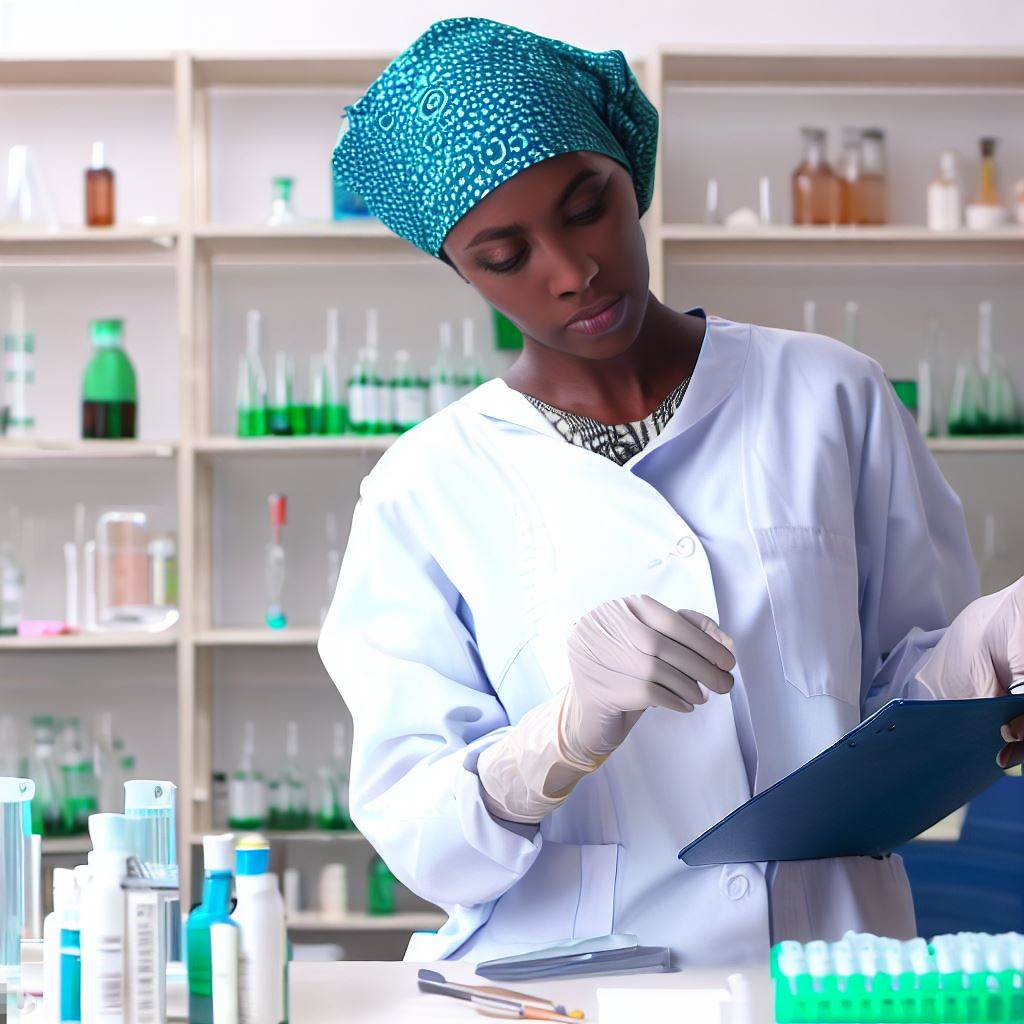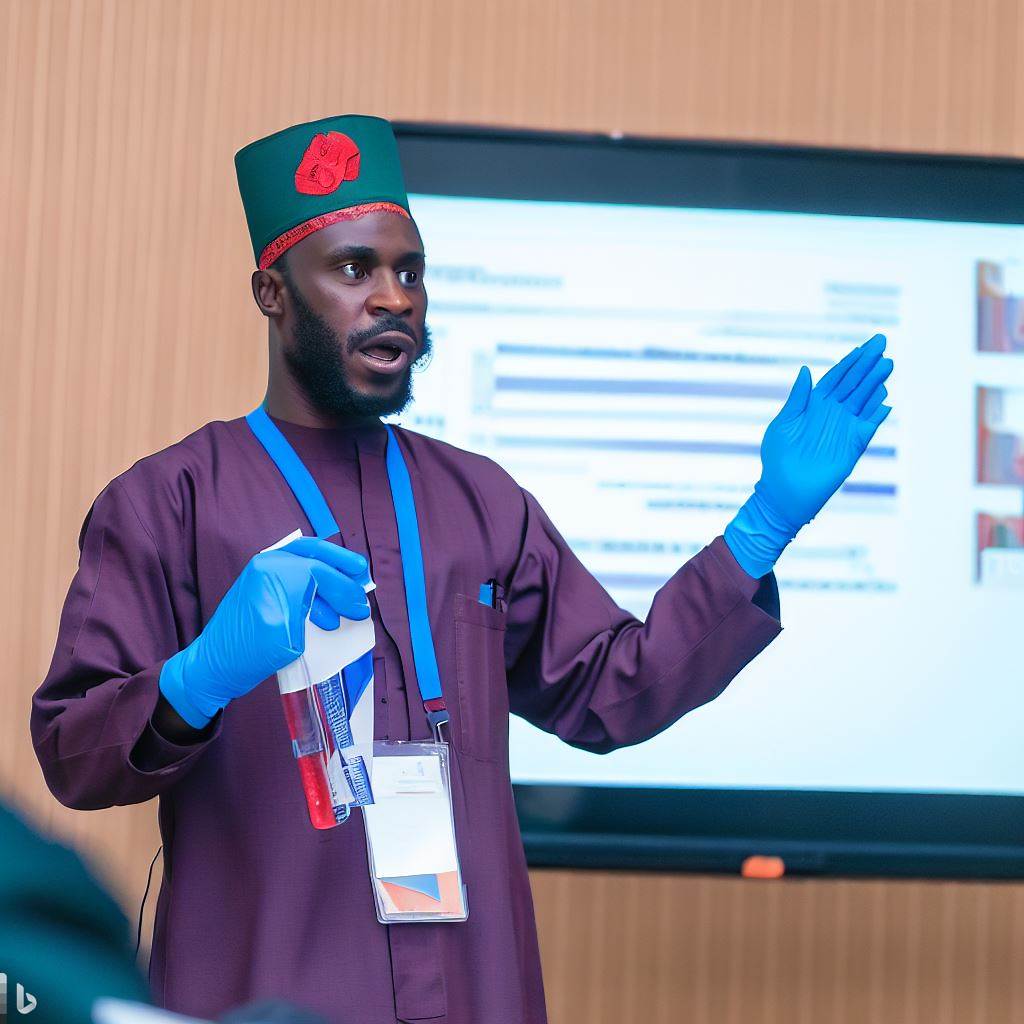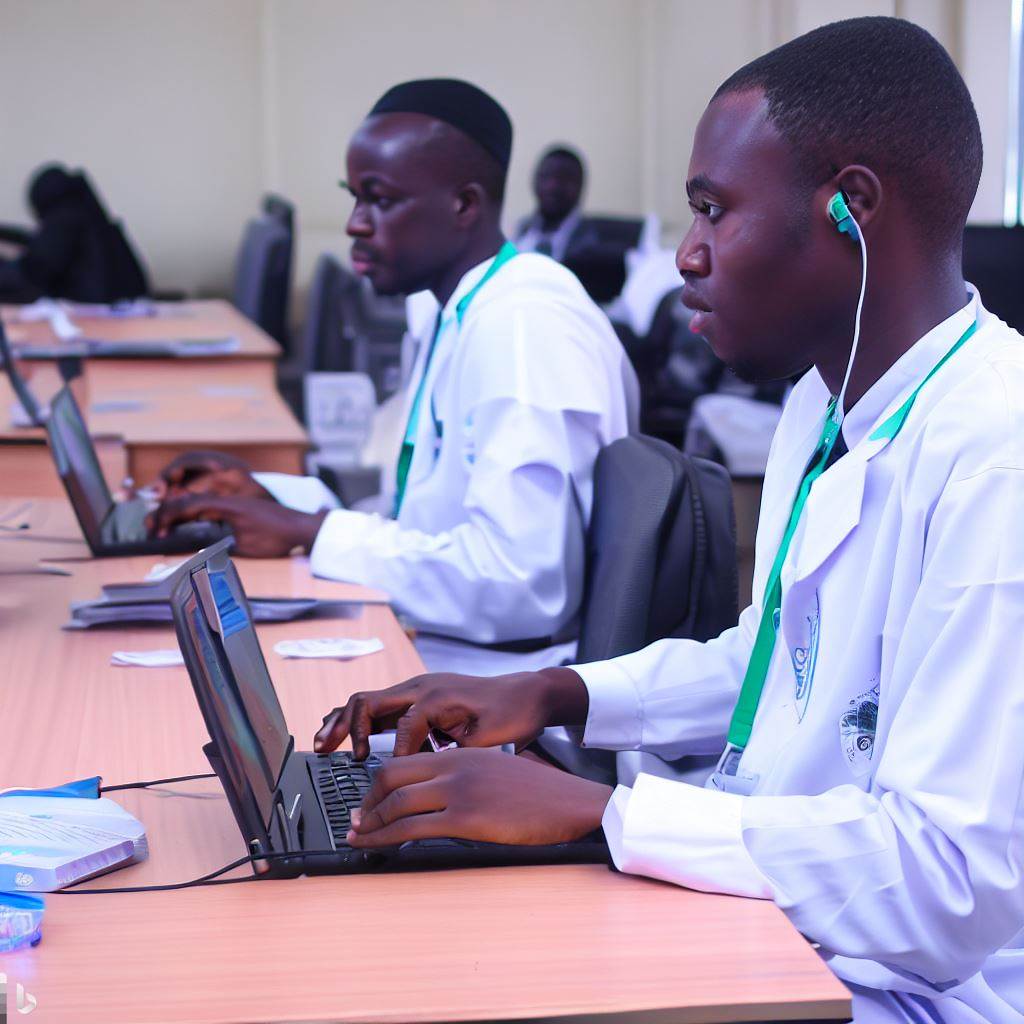Introduction
Covid-19 is a highly contagious respiratory illness caused by the novel coronavirus. The purpose of this blog post is to analyze how Covid-19 has affected the field of phlebotomy in Nigeria.
Thesis statement
This blog post explores the impact of Covid-19 on phlebotomy practices in Nigeria.
Covid-19, caused by the novel coronavirus, has significantly impacted various aspects of the healthcare sector globally.
In Nigeria, the field of phlebotomy, which involves the collection of blood samples for diagnostic testing, has been greatly affected by the pandemic.
This blog post delves into the implications of Covid-19 on phlebotomy practices in Nigeria.
The emergence of Covid-19 has led to unprecedented changes in healthcare protocols and procedures.
Phlebotomy, being an essential part of medical diagnostics, has been affected by the need for stringent infection control measures.
The close contact required during blood collection puts both phlebotomists and patients at risk of contracting the virus.
As a result, phlebotomy centers in Nigeria have had to implement various safety measures to minimize the risk of Covid-19 transmission.
These include mandatory personal protective equipment (PPE) for phlebotomists, increased sanitization protocols, and the reduction of non-essential blood collections.
Moreover, the fear and uncertainty surrounding the pandemic have created hesitancy among patients to visit healthcare facilities for routine blood tests.
This has led to a significant decline in phlebotomy procedures, causing financial strain and job insecurity among phlebotomists in Nigeria.
In the end, the impact of Covid-19 on phlebotomy in Nigeria has been substantial.
This blog post will delve into the various challenges faced by phlebotomists and the healthcare system in adapting to the new normal imposed by the pandemic.
It will also explore the potential long-term effects of Covid-19 on the field of phlebotomy in Nigeria. Stay tuned for further insights and analysis in the upcoming chapters of this series.
Understanding Phlebotomy in Nigeria
Definition and role of phlebotomy
Phlebotomy is the medical practice of drawing blood from patients for diagnostic testing or donation purposes.
It plays a crucial role in healthcare by aiding in the collection of blood samples that provide valuable information to healthcare professionals.
Importance of phlebotomy in healthcare
- Accurate diagnosis: Phlebotomy enables healthcare professionals to collect blood samples for laboratory testing, aiding in the accurate diagnosis of various medical conditions.
- Disease monitoring: Phlebotomy allows for regular monitoring of chronic illnesses, such as diabetes or cardiovascular diseases, by analyzing blood samples for markers of disease progression or treatment efficacy.
- Transfusion preparation: Blood collected through phlebotomy is crucial in preparing blood transfusions for patients in need, especially those with severe bleeding or undergoing surgical procedures.
- Research and development: Phlebotomy facilitates the collection of blood samples for research purposes, enabling scientists to study diseases, develop new treatments, and improve healthcare practices.
Current state of phlebotomy in Nigeria
- Lack of standardized training: Nigeria is currently facing challenges in the phlebotomy sector due to the absence of a standardized training program for phlebotomists.
- Limited awareness: Many individuals in Nigeria are still unaware of the importance of phlebotomy in healthcare, leading to a lack of appreciation and recognition for phlebotomists.
- Inadequate infrastructure: Some healthcare facilities in Nigeria lack the necessary equipment and resources for efficient phlebotomy practices, hindering accurate blood collection and testing.
- Shortage of skilled phlebotomists: Nigeria is experiencing a shortage of trained and skilled phlebotomists, resulting in increased workload for existing professionals and potential errors in blood collection.
- Quality control challenges: Due to the lack of standardized training and limited resources, ensuring proper quality control in phlebotomy practices becomes a significant challenge in Nigeria.
Basically, phlebotomy plays a vital role in healthcare by enabling the collection of blood samples for diagnostic purposes, disease monitoring, transfusion preparation, and research.
However, in Nigeria, the lack of standardized training, limited awareness, inadequate infrastructure, shortage of skilled professionals, and quality control challenges pose significant obstacles to the advancement of phlebotomy practices.
Efforts should be made to address these issues and improve the state of phlebotomy in Nigeria, ensuring accurate and efficient blood collection and testing for better patient care.
Read: Career Progression in Optometry: A Nigerian Perspective
The Emergence of Covid-19 in Nigeria
History of the pandemic in Nigeria
At the end of February 2020, Nigeria recorded its first case of Covid-19, an Italian man who had returned from Milan.
The number of cases quickly increased, leading the government to take decisive action to control the spread.
Measures taken to combat the spread of Covid-19
The Nigerian government implemented several measures to combat the spread of the virus.
They imposed lockdowns in major cities, closed international borders, and restricted domestic travel.
Impact of Covid-19 on Nigeria’s healthcare system
The emergence of Covid-19 has had a significant impact on Nigeria’s healthcare system.
Hospitals became overwhelmed with Covid-19 patients, leading to a strain on resources and healthcare workers.
The pandemic also exposed the weak healthcare infrastructure in the country, with a shortage of testing facilities and medical equipment.
Additionally, the fear of contracting the virus led many people to avoid hospitals, resulting in delayed or neglected healthcare for other conditions.
Effect of Covid-19 on phlebotomy in Nigeria
The impact of Covid-19 on phlebotomy in Nigeria has been substantial.
Phlebotomists, who are responsible for collecting blood samples, face increased risks of exposure to the virus as they interact closely with patients.
The fear of transmission of the virus has made both patients and healthcare workers more cautious during the phlebotomy process.
This caution includes the use of personal protective equipment, such as gloves, masks, and gowns, to minimize the risk of infection.
Additionally, the demand for blood testing and diagnostic services related to Covid-19 has surged, increasing the workload for phlebotomists.
Challenges faced by phlebotomists during the pandemic
Phlebotomists in Nigeria encounter several challenges during the Covid-19 pandemic.
One major challenge is the shortage of personal protective equipment, hindering their ability to safely perform their duties.
The increased workload and pressure due to high patient volumes also put a strain on their physical and mental well-being.
Furthermore, the limited availability of testing facilities and delayed test results affect the efficiency of phlebotomy services.
Adaptations in phlebotomy practices
To address the challenges posed by Covid-19, phlebotomy practices in Nigeria have made several adaptations.
Phlebotomists have been provided with adequate personal protective equipment to ensure their safety and to minimize the risk of transmission.
Additionally, mobile phlebotomy services have been introduced to reach patients who cannot visit healthcare facilities due to lockdown or fear of exposure.
Telephlebotomy, where patients are guided remotely to collect their own blood samples at home, has also been implemented to reduce the need for physical contact.
Future implications for phlebotomy in Nigeria
The emergence of Covid-19 has brought about permanent changes in phlebotomy practices in Nigeria.
The importance of proper infection control measures and the use of personal protective equipment will continue to be emphasized.
Phlebotomists will need to adapt to new protocols and guidelines to ensure the safety of both themselves and their patients.
Additionally, the increased demand for phlebotomy services, particularly related to Covid-19 testing, may necessitate the expansion and improvement of infrastructure and resources.
In fact, the emergence of Covid-19 in Nigeria has had a significant impact on phlebotomy practices.
Phlebotomists continue to play a crucial role in the diagnosis and monitoring of Covid-19 patients, despite facing numerous challenges.
The pandemic has highlighted the importance of adapting phlebotomy practices to ensure the safety of healthcare workers and patients alike.
Read: Advanced Career Paths for Pharmacy Technicians in Nigeria
Changes in Phlebotomy Practices due to
Covid-19
Required infection control measures
- Implementation of strict hand hygiene protocols to minimize the risk of transmission.
- Regular disinfection of phlebotomy equipment and work surfaces to maintain a clean environment.
- Screening of patients for Covid-19 symptoms and travel history before performing phlebotomy procedures.
- Isolation of suspected or confirmed Covid-19 cases to prevent cross-contamination.
Personal protective equipment (PPE) in phlebotomy
Mandatory use of appropriate PPE, including gloves, gowns, masks, and eye protection. Staff members are required to undergo training on proper donning and doffing techniques for PPE.
Regular monitoring of PPE supply to ensure an adequate stock for healthcare workers. PPE disposal should be done following proper guidelines to reduce the risk of contamination.
Social distancing and its effect on phlebotomy procedures
Reduction in the number of patients scheduled for phlebotomy to allow for social distancing in waiting areas.
Appointment-based phlebotomy services to minimize overcrowding and maintain proper distance between patients.
Physical barriers, such as transparent shields, installed to separate phlebotomists and patients during procedures.
Encouraging patients to wait outside or in their vehicles until called for phlebotomy, decreasing the overall waiting time.
Modified patient interactions and consent process
Virtual pre-visit consultations to assess the necessity of phlebotomy and provide necessary instructions. Electronic consent forms to minimize physical contact and reduce the risk of paper transmission.
Verbal consent in place of written consent to limit unnecessary handling of pens and paper.
Use of digital devices to display information and educate patients about the procedure, reducing face-to-face interactions.
In general, the Covid-19 pandemic has necessitated significant changes in phlebotomy practices in Nigeria.
These changes aim to ensure the safety of both patients and healthcare workers, and to minimize the risk of transmission.
By implementing infection control measures, utilizing appropriate PPE, practicing social distancing, and modifying patient interactions and consent processes, phlebotomy services can continue to operate effectively while mitigating the impact of the pandemic.
Read: Success Stories: Prominent Nigerian Phlebotomists
Challenges Faced by Phlebotomists during Covid-19
Decreased patient visits and blood collections
Phlebotomists experienced a decline in patient visits and blood collections due to the pandemic. Lockdowns, fear, and restricted access to healthcare facilities contributed to this decrease.
Many patients postponed or canceled routine check-ups, resulting in fewer opportunities for blood collection.
Increased workload for phlebotomists
Despite fewer patients, the workload for phlebotomists increased during the Covid-19 period. They had to follow stringent safety protocols, including increased cleaning and disinfection measures.
Additional tasks, such as screening patients for Covid-19 symptoms, added to their workload.
Fear and anxiety among phlebotomy professionals
Covid-19 brought about fear and anxiety among phlebotomy professionals in Nigeria. They were at risk of contracting the virus due to close contact with patients.
The fear of transmitting the virus to their families and loved ones also took a toll on their mental health.
Lack of resources and proper training
Phlebotomy professionals in Nigeria faced challenges due to a lack of resources and proper training. Shortages of personal protective equipment (PPE) affected their ability to safely carry out their duties.
Insufficient training on handling Covid-19 cases increased the risk of exposure and transmission.
Overall, the Covid-19 pandemic has presented significant challenges to phlebotomists in Nigeria. They have experienced a decrease in patient visits and blood collections, leading to a decline in their daily workload.
However, despite the decrease in patient numbers, their workload has increased due to strict safety protocols and additional tasks.
Additionally, fear and anxiety have affected phlebotomists as they face a higher risk of contracting the virus.
The fear of transmitting the virus to their loved ones has also had a psychological impact on their well-being.
Moreover, the lack of resources and proper training has hindered the ability of phlebotomy professionals to carry out their duties safely and effectively.
Shortages of PPE have put them at risk, and insufficient training on handling Covid-19 cases has increased the likelihood of exposure and transmission.
In a nutshell, the challenges faced by phlebotomists in Nigeria during the Covid-19 pandemic are multifaceted.
Decreased patient visits and blood collections, increased workload, fear and anxiety, and the lack of resources and proper training have all posed hurdles for these healthcare professionals.
Addressing these challenges is crucial to ensure the well-being of phlebotomists and the quality of healthcare services provided in Nigeria.
Read: Scope and Responsibilities of a Nigerian Optometrist

Strategies and Adaptations in Phlebotomy Practice
Ensuring the safety of phlebotomists and patients
Provide personal protective equipment (PPE) for phlebotomists to minimize exposure to COVID-19. Implement strict infection control measures such as frequent hand washing and disinfecting equipment.
Screen patients for COVID-19 symptoms before scheduling phlebotomy procedures. Ensure proper social distancing measures are followed in waiting areas and during blood collection.
Phlebotomy practice in Nigeria has faced numerous challenges due to the COVID-19 pandemic.
However, through strategic planning and adaptations, safety measures have been implemented to protect both phlebotomists and patients.
The use of personal protective equipment, strict infection control measures, and patient screening protocols have become essential in maintaining a safe environment for blood collection procedures.
Implementing telephlebotomy and mobile blood collection services
Offer telephlebotomy services where phlebotomists guide patients remotely on blood collection procedures.
Establish mobile blood collection units to reach patients who are unable to visit healthcare facilities. Schedule appointments for home visits to minimize patient risk and maintain continuity of care.
Ensure proper transportation and storage of collected blood samples to maintain integrity.
To ensure the uninterrupted provision of phlebotomy services, innovative approaches such as telephlebotomy and mobile blood collection services have been adopted.
Telephlebotomy allows phlebotomists to guide patients remotely on blood collection procedures, reducing the need for physical contact.
Mobile blood collection units have been deployed to reach patients who are unable to visit healthcare facilities, ensuring their access to necessary diagnostic tests.
Utilizing technology for remote monitoring and consults
Implement remote monitoring systems to track patient vital signs and provide real-time updates to healthcare professionals.
Use telemedicine platforms for remote consults between phlebotomists and patients or healthcare providers.
Share digital laboratory test results electronically to reduce physical contact and transmission risks. Explore the use of wearable devices to monitor patients’ health parameters remotely.
Technology has played a crucial role in facilitating remote monitoring and consults in phlebotomy practice.
Remote monitoring systems enable healthcare professionals to track patient vital signs, providing real-time updates without direct contact.
Telemedicine platforms allow for virtual consults between phlebotomists, patients, and other healthcare providers, enhancing the delivery of care.
Digital laboratory test results are shared electronically, reducing physical contact and the risk of transmission.
Wearable devices are being explored to remotely monitor patients’ health parameters, enabling timely intervention and reducing the need for in-person follow-ups.
Enhancing training programs for phlebotomy professionals
Update training curricula to include COVID-19-specific protocols and infection control measures. Provide comprehensive education on the correct use and disposal of PPE.
Offer virtual training sessions and webinars to ensure continuous professional development. Emphasize the importance of effective communication skills when dealing with anxious or distressed patients.
To equip phlebotomy professionals with the necessary skills and knowledge, training programs have been enhanced.
Updated curricula now incorporate COVID-19-specific protocols and emphasize infection control measures.
Education on the correct use and disposal of personal protective equipment is provided, ensuring the safety of phlebotomists.
Virtual training sessions and webinars are organized to offer continuous professional development opportunities.
Effective communication skills are also emphasized to address the emotional needs of anxious or distressed patients during these challenging times.
Phlebotomy professionals are trained to provide support and reassurance, creating a positive patient experience.
Essentially, the COVID-19 pandemic has necessitated significant adaptations in phlebotomy practice in Nigeria.
Strategies have been implemented to ensure the safety of phlebotomists and patients, including the use of personal protective equipment and strict infection control measures.
Telephlebotomy, mobile blood collection services, and technology-enabled remote monitoring and consults have been introduced.
Training programs have been enhanced to incorporate COVID-19-specific protocols and emphasize effective communication skills.
These strategies and adaptations have played a vital role in maintaining essential phlebotomy services while minimizing the risk of COVID-19 transmission.
Read: Top Institutions to Study Phlebotomy in Nigeria
Explore Further: In-Depth: Nigeria’s Orthotic and Prosthetic Curriculum
Future Implications and Recommendations
Long-term effects of Covid-19 on phlebotomy in Nigeria
The Covid-19 pandemic has had significant and lasting effects on phlebotomy practices in Nigeria. Shortages of skilled phlebotomists have been exacerbated by the impact of the virus.
Increased demand for testing and treatment has put immense pressure on phlebotomy services. Phlebotomy procedures have had to adapt to new safety protocols, causing delays and inefficiencies.
Post-Covid, the healthcare system in Nigeria will need to address these long-term effects to ensure efficient phlebotomy services.
Strengthening healthcare infrastructure and training programs
Investments must be made to enhance the healthcare infrastructure, specifically in relation to phlebotomy services.
Increased funding for training programs will help meet the growing demand for skilled phlebotomists. Public and private partnerships can play a crucial role in improving infrastructure and training.
Collaboration between healthcare facilities and educational institutions will ensure a sustainable pipeline of competent phlebotomists.
Investing in research and innovation
Research studies should focus on the long-term effects of Covid-19 on the field of phlebotomy. Investments in innovation will help develop new technologies and tools to improve phlebotomy practices.
New techniques, such as non-invasive blood collection methods, should be explored to minimize risk and increase efficiency.
Collaboration between researchers, industry experts, and healthcare professionals will drive innovation in phlebotomy.
Promoting public awareness and education on phlebotomy
Public awareness campaigns should be launched to educate the population about the importance of phlebotomy.
Efforts should be made to dispel misconceptions and fears surrounding phlebotomy procedures.
Health education programs in schools and communities can raise awareness about the role of phlebotomists.
Training programs should incorporate public education modules to empower individuals with knowledge about phlebotomy.
All in all, the long-term effects of Covid-19 on phlebotomy in Nigeria are significant.
To address these effects, it is essential to strengthen healthcare infrastructure and training programs, invest in research and innovation, and promote public awareness and education.
By prioritizing these recommendations, Nigeria can ensure efficient and effective phlebotomy services in the future.
Conclusion
Brief summary of the main points discussed
Throughout this blog post, we have highlighted the significant impact of Covid-19 on phlebotomy in Nigeria.
We discussed the challenges faced by phlebotomists due to the pandemic, including the shortage of personal protective equipment and the increased risk of exposure to the virus.
We also explored the decreased availability of blood donors and the reduced number of blood drives.
Despite these challenges, we acknowledged the determination and resilience of phlebotomists in adapting to the new normal and ensuring the continuation of essential blood collection services.
Reiteration of the impact of Covid-19 on phlebotomy in Nigeria
Covid-19 has severely affected the field of phlebotomy in Nigeria, disrupting the usual workflow and posing significant challenges to phlebotomists.
The pandemic has highlighted the need for adequate support, training, and resources to ensure the safety of healthcare workers involved in blood collection.
Closing thoughts and call to action
As we conclude, it is crucial for the Nigerian government and healthcare institutions to prioritize the protection and well-being of phlebotomists.
Adequate supply of personal protective equipment, regular testing, and improved safety protocols must be ensured.
Moreover, increased public awareness and encouragement for blood donation can help address the shortage of blood supply.
Together, we can overcome the challenges posed by Covid-19 and ensure the continued provision of safe and efficient phlebotomy services.




